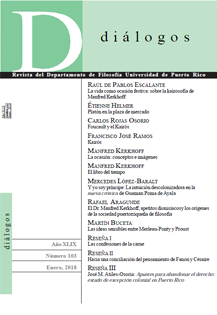Abstract
The notion of utility is decisive when interpreting the meaning of human acts, as it impedes the falling of consciousness into solipsism. Human knowledge is not limited by an intrinsic reflection of perceptions and ideas, but rather an open process to the world of life. In this spirit, similar to the pragmatism of C. I. Lewis, Spinoza coins new notions, a lot of them more adapted to the natural and human environment. The first effect of the new attitude is an effective connection between moral education and the education of the understanding. Our study is an approximation of the duality imagination/understanding from its educational function. Perceptions and ideas, common notions, conatus, affectus, virtus are new concepts that Spinoza offloads into the world, and are now the new conceptual packages setting the standards for common life. The traditional epistemic model (centered on the division between subject and object) gives way for a different model centered on cognitive action: Education of the understanding is the keystone of moral education.Downloads
Download data is not yet available.

